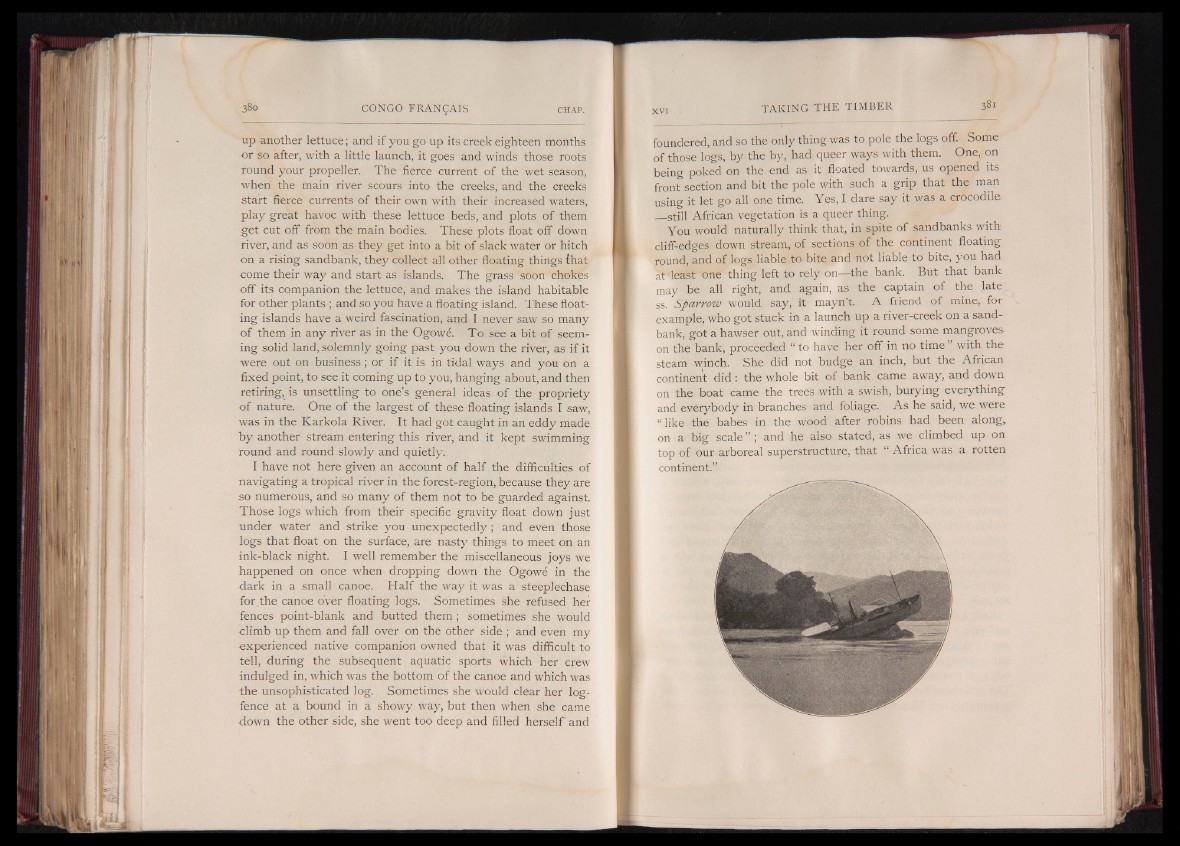
up another lettuce; and if you go up its creek eighteen months
or so after, with a little launch, it goes and winds those roots
round your propeller. The fierce current of the wet season,
when the main river scours into the creeks, and the creeks
start fierce currents of their own with their increased waters,
play great havoc with these lettuce beds, and plots of them
get cut off from the main bodies. These plots float off down
river, and as soon as they get into a bit of slack water or hitch
on a rising sandbank, they collect all other floating things fhat
come their way and start as islands. The grass soon chokes
off its companion the lettuce, and makes the island habitable
for other plants ; and so you have a floating island. These floating
islands have a weird fascination, and I never saw so many
o f them in any river as in the Ogowi. To see a bit of seeming
solid land, solemnly going past you down the river, as if it
were out on business; or if it is in tidal ways and you on a
fixed point, to see it coming up to you, hanging about, and then
retiring, is unsettling to one’s general ideas of the propriety
o f nature. One of the largest of these floating islands I saw,
was in the Karkola River. It had got caught in an eddy made
by another stream entering this river, and it kept swimming
round and round slowly and quietly.
I have not here given an account of half the difficulties of
navigating a tropical river in the forest-region, because they are
so numerous, and so many of them not to be guarded against.
Those logs which from their specific gravity float down just
under water and strike you unexpectedly; and even those
logs that float on the surface, are nasty things to meet on an
ink-black night. I well remember the miscellaneous joys we
happened on once when dropping down the Ogowe in the
dark in a small canoe. Half the way it was a steeplechase
for the canoe over floating logs. Sometimes she refused her
fences point-blank and butted them; sometimes she would
climb up them and fall over on the other side ; and even my
experienced native companion owned that it was difficult to
tell, during the subsequent aquatic sports which her crew
indulged in, which was the bottom of the canoe and which was
the unsophisticated log. Sometimes she would clear her log-
fence at a bound in a showy, way, but then when she came
down the other side, she went too deep and filled herself and
foundered, and so the only thing was to pole the logs off. Some
of those logs, by the by, had queer ways with them. One, on
being poked on the end as it floated towards, us opened its
front section and bit the pole with such a grip that the man
using it let go all one time. Yes, I dare say it was a crocodile
still African vegetation is a queer thing.
You would naturally think that, in spite of sandbanks with
cliff-edges down stream, of sections of the continent floating
round, and of logs liable to bite and not liable to bite, you had
at'least one thing left to rely on— the bank. But that bank
may be all right, and again, as the captain of the late
ss. Sparrow would say, it mayn’t. A friend of mine, for
example, who got stuck in a launch up a river-creek on a sandbank,
got a hawser out, and winding it round some mangroves
on the bank, proceeded “ to have her off in no time ” with the
steam winch. She did not budge an inch, but the African
continent did : the whole bit of bank came away, and down
on the boat came the trees with a swish, burying everything
and everybody in branches and foliage. As he said, we were
“ like the babes in the wood after robins had been along,
on a big scale ” ; and he also stated, as we climbed up on
top of our arboreal superstructure, that “ Africa was a rotten
continent.”